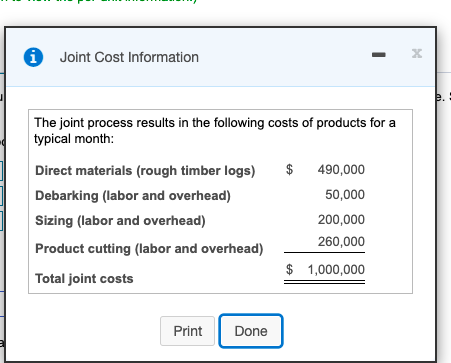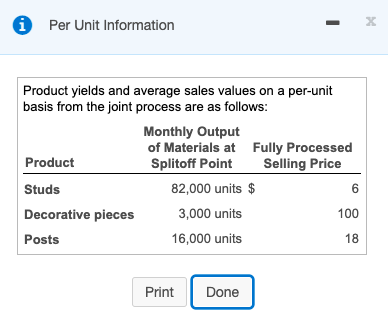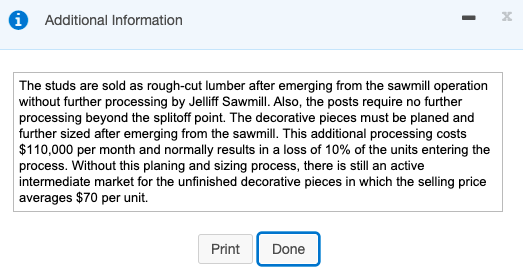






Jelliff Sawmill, Inc., (JSI), purchases logs from independent timber contractors and processes the logs into three types of lumber products. These products are the result of a joint sawmill process that involves removal of bark from the logs, cutting the logs into a workable size (ranging from 8 to 16 feet in length), and then cutting the individual products from the logs. E: (Click the icon to view the joint cost information.) E: (Click the icon to view the per-unit information.) (Click the icon to view additional information.) Read the requirements. Requirement 1. Based on the information given for Jelliff Sawmill, allocate the joint processing costs of $1,000,000 to the three products using the (a) Sales value at splitoff method, (b) Physical measure method (volume in units), and (c) NRV method. a. Begin by allocating the joint processing costs of $1,000,000 to the three products using the Sales value at splitoff method. (Round the weights to four decimal places.) Studs Decorative pieces Posts Total Monthly unit output Selling price per unit Sales value of total production at splitoff Weighting Joint costs allocated b. Based on the information given for Jelliff Sawmill, allocate the joint processing costs of $1,000,000 to the three products using the Physical-measure method (volume in units). (Round the weights to four decimal places.) Studs Decorative pieces Posts Total Physical measure of total production Weighting Joint costs allocated c. Based on the information given for Jelliff Sawmill, allocate the joint processing costs of $1,000,000 to the three products using the NRV method. (Round the weights to four decimal places.) Studs Decorative pieces Posts Total Monthly units of total production Fully processed selling price per unit Net realizable value at splitoff Weighting Joint costs allocated Requirement 2. Prepare an analysis for Jelliff Sawmill that compares processing the decorative pieces further, as it currently does, with selling them as a rough-cut product immediately at splitoff. (Use parentheses or a minus sign for decreases in contribution.) Units Dollars Monthly unit output Less: Normal further processing shrinkage Units available for sale Final sales value Less: Sales value at splitoff Incremental revenue Less: Further processing costs Increase/(decrease) in contribution from further processing Requirement 3. Assume Jelliff Sawmill announced that in six months it will sell the unfinished decorative pieces at splitoff due to increasing competitive pressure. Select three types of likely behavior that will be demonstrated by the skilled labor in the planing-and-sizing process as a result of this announcement. Behavior that may be demonstrated by the skilled labor in the planing-and-sizing process include the following: Management actions that could improve this behavior include the following: Improve communication by giving the workers: The company can offer incentive bonuses to and align rewards with goals. The company could job relocation and internal job transfers. A Joint Cost Information X 2. The joint process results in the following costs of products for a typical month: Direct materials (rough timber logs) $ 490,000 Debarking (labor and overhead) 50,000 Sizing (labor and overhead) 200,000 Product cutting (labor and overhead) 260,000 Total joint costs $ 1,000,000 Print Done i Per Unit Information X Product yields and average sales values on a per-unit basis from the joint process are as follows: Monthly Output of Materials at Fully Processed Product Splitoff Point Selling Price Studs 82,000 units $ 6 Decorative pieces 3,000 units 100 Posts 16,000 units 18 Print Done Additional Information The studs are sold as rough-cut lumber after emerging from the sawmill operation without further processing by Jelliff Sawmill. Also, the posts require no further processing beyond the splitoff point. The decorative pieces must be planed and further sized after emerging from the sawmill. This additional processing costs $110,000 per month and normally results in a loss of 10% of the units entering the process. Without this planing and sizing process, there is still an active intermediate market for the unfinished decorative pieces in which the selling price averages $70 per unit. Print Done













